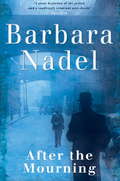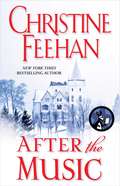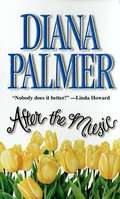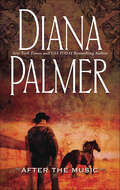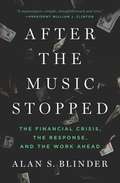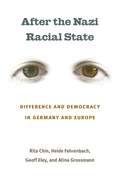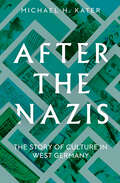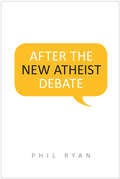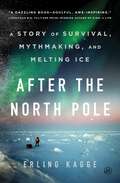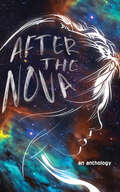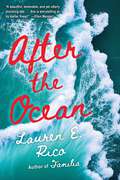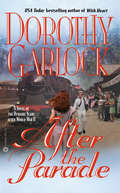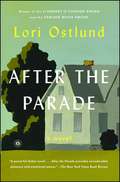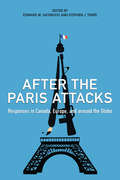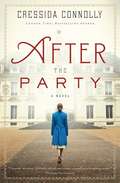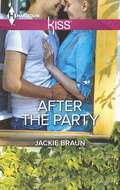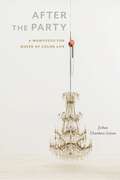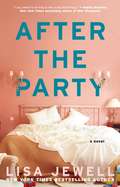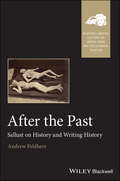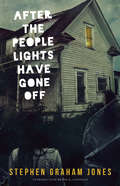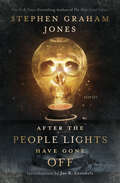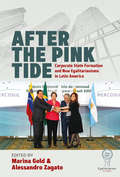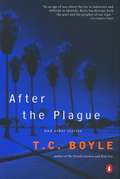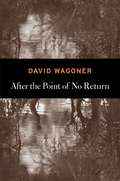- Table View
- List View
After the Mourning: An unputdownable World War Two crime thriller (Francis Hancock Mystery #2)
by Barbara NadelAfter the Mourning is the second novel in the acclaimed Francis Hancock World War Two crime series by Barbara Nadel. Perfect for fans of Martin Walker and Maureen Jennings. 'The denouement is exciting... the atmosphere of a city under nightly bombardment is very well portrayed and I'm looking forward to the next book' - Sunday Telegraph Undertaker Francis Hancock has seen the worst that humanity can do to itself. Why then does the murder of a young gypsy girl in Epping Forest move him so much? Travellers, gypsies, the homeless, deserters and German spies inhabit this stretch of open ground that was once her home. Francis knows it's not wise to delve into this human melting pot, but he is drawn to the exotic customs of the gypsies, their music and magic. But as he investigates the girl's murder further, the death toll rises and Francis uncovers a much bigger conspiracy, at the heart of which lies something even Adolf Hitler is prepared to kill for...What readers are saying about After the Mourning:'Probably one of the best books I have read in a long while''I'd recommend this book to lovers of atmospheric and well-plotted crime novels' 'Nadel's sense of time and place is outstanding'
After the Music
by Christine FeehanFrom the #1 New York Times bestselling author this sizzling holiday paranormal romance is now available as an eBook for the first time ever!Terrified by mysterious threats, Jessica Fitzpatrick takes her twin wards to the island mansion of their estranged father, Dillon Wentworth, a famous musician who became a recluse after a fire claimed his wife's life and left him disfigured. With Christmas approaching, the spark between Dillon and Jessica might light the future, but the evil machinations of those who share his wife's love of the occult may plunge the family into darkness--unless a Christmas miracle occurs.
After the Music
by Diana PalmerIt all started as a joke. Sabina was only pretending to be engaged to her best friend, millionaire Al Thorndon. Al had talked her into this scheme as a way to trick his older brother, Thorn. Al had no choice but to lie. And to make Sabina his accomplice. Sabina thought that it would be for just one night. When Thorn accused her of being a gold digger, Sabina just laughed it off. She didn't think of the repercussions-that Thorn would dig up her long-buried secrets. Revealing them now would destroy everything she'd worked so hard to put behind her. But she couldn't let her best friend down, could she?
After the Music
by Diana PalmerA sexy oil magnate yearns for a sultry singer in this classic romance by the New York Times–bestselling author.Rock star Sabina Cane had heard plenty about the wealthy Hamilton Regan Thorndon III, head honcho of Thorn Oil. His brother, Al, warned her of Thorn’s reputation for breaking hearts, but singing was Sabina’s life and she was grateful for any work she could get. She and her band would take the gig in the New Orleans nightclub, even if it was owned by Mr. Thorndon III.But Thorn wasn’t the stuffy old businessman she’d expected. He was prickly, passionate, rock stubborn and liked to play matchmaker. And he had the perfect match in mind: he wanted Sabina, no matter what the cost. Didn’t he know that there are some things money can’t buy?First published in 1986.
After the Music Stopped
by Alan S. BlinderNamed one of the Ten Best Books of 2013 by Michiko Kakutani and the New York Times Book Review "Blinder is a master storyteller . . . one of the best books yet about the financial crisis." --The Wall Street Journal Alan S. Blinder--esteemed Princeton professor, Wall Street Journal columnist, and former vice chairman of the Federal Reserve Board under Alan Greenspan--is one of our wisest and most clear-eyed economic thinkers. In After the Music Stopped, he delivers a masterful narrative of how the worst economic crisis in postwar American history happened, what the government did to fight it, and what we must do to recover from it. With bracing clarity, Blinder chronicles the perfect storm of events beginning in 2007, from the bursting of the housing bubble to the implosion of the bond bubble, and how events in the U.S. spread throughout the interconnected global economy. Truly comprehensive and eminently readable, After the Music Stopped is the essential book about the financial crisis.
After the Music Stopped: The Financial Crisis, the Response, and the Work Ahead
by Alan S. BlinderNew York Times BestsellerOne of our wisest and most clear-eyed economic thinkers offers a masterful narrative of the crisis and its lessons.Many fine books on the financial crisis were first drafts of history—books written to fill the need for immediate understanding. Alan S. Blinder, esteemed Princeton professor, Wall Street Journal columnist, and former vice chairman of the Federal Reserve Board, held off, taking the time to understand the crisis and to think his way through to a truly comprehensive and coherent narrative of how the worst economic crisis in postwar American history happened, what the government did to fight it, and what we can do from here—mired as we still are in its wreckage.With bracing clarity, Blinder shows us how the U.S. financial system, which had grown far too complex for its own good—and too unregulated for the public good—experienced a perfect storm beginning in 2007. Things started unraveling when the much-chronicled housing bubble burst, but the ensuing implosion of what Blinder calls the “bond bubble” was larger and more devastating. Some people think of the financial industry as a sideshow with little relevance to the real economy—where the jobs, factories, and shops are. But finance is more like the circulatory system of the economic body: if the blood stops flowing, the body goes into cardiac arrest. When America’s financial structure crumbled, the damage proved to be not only deep, but wide. It took the crisis for the world to discover, to its horror, just how truly interconnected—and fragile—the global financial system is. Some observers argue that large global forces were the major culprits of the crisis. Blinder disagrees, arguing that the problem started in the U.S. and was pushed abroad, as complex, opaque, and overrated investment products were exported to a hungry world, which was nearly poisoned by them.The second part of the story explains how American and international government intervention kept us from a total meltdown. Many of the U.S. government’s actions, particularly the Fed’s, were previously unimaginable. And to an amazing—and certainly misunderstood—extent, they worked. The worst did not happen. Blinder offers clear-eyed answers to the questions still before us, even if some of the choices ahead are as divisive as they are unavoidable. After the Music Stopped is an essential history that we cannot afford to forget, because one thing history teaches is that it will happen again.
After the Nazi Racial State: Difference and Democracy in Germany and Europe
by Geoff Eley Rita Chin Heide Fehrenbach Atina GrossmannWhat happened to "race," race thinking, and racial distinctions in Germany, and Europe more broadly, after the demise of the Nazi racial state? This book investigates the afterlife of "race" since 1945 and challenges the long-dominant assumption among historians that it disappeared from public discourse and policy-making with the defeat of the Third Reich and its genocidal European empire. Drawing on case studies of Afro-Germans, Jews, and Turks---arguably the three most important minority communities in postwar Germany---the authors detail continuities and change across the 1945 divide and offer the beginnings of a history of race and racialization after Hitler. A final chapter moves beyond the German context to consider the postwar engagement with "race" in France, Britain, Sweden, and the Netherlands, where waves of postwar, postcolonial, and labor migration troubled nativist notions of national and European identity. After the Nazi Racial State poses interpretative questions for the historical understanding of postwar societies and democratic transformation, both in Germany and throughout Europe. It elucidates key analytical categories, historicizes current discourse, and demonstrates how contemporary debates about immigration and integration---and about just how much "difference" a democracy can accommodate---are implicated in a longer history of "race." This book explores why the concept of "race" became taboo as a tool for understanding German society after 1945. Most crucially, it suggests the social and epistemic consequences of this determined retreat from "race" for Germany and Europe as a whole.
After the Nazis: The Story of Culture in West Germany
by Michael H. KaterA wide-ranging, insightful history of culture in West Germany—from literature, film, and music to theater and the visual arts After World War II a mood of despair and impotence pervaded the arts in West Germany. The culture and institutions of the Third Reich were abruptly dismissed, yet there was no immediate return to the Weimar period&’s progressive ideals. In this moment of cultural stasis, how could West Germany&’s artists free themselves from their experiences of Nazism? Moving from 1945 to reunification, Michael H. Kater explores West German culture as it emerged from the darkness of the Third Reich. Examining periods of denial and complacency as well as attempts to reckon with the past, he shows how all postwar culture was touched by the vestiges of National Socialism. From the literature of Günter Grass to the happenings of Joseph Beuys and Karlheinz Stockhausen&’s innovations in electronic music, Kater shows how it was only through the reinvigoration of the cultural scene that West Germany could contend with its past—and eventually allow democracy to reemerge.
After the New Atheist Debate
by Phil RyanThe first decade of the twenty-first century saw a number of best-selling books which not only challenged the existence of god, but claimed that religious faith was dangerous and immoral. The New Atheists, as writers such as Richard Dawkins, Christopher Hitchens, Sam Harris, and Daniel Dennett have become known, sparked a vicious debate over religion's place in modern society.In After the New Atheist Debate, Phil Ryan offers both an elegant summary of this controversy and a path out of the cul-de-sac that this argument has become. Drawing on the social sciences, philosophy, and theology, Ryan examines the claims of the New Atheists and of their various religious and secular opponents and finds both sides wanting.Rather than the mutual demonization that marks the New Atheist debate, Ryan argues that modern society needs respectful ethical dialogue in which citizens present their points of view and seek to understand the positions of others. Lucidly written and clearly argued, After the New Atheist Debate is a book that brings welcome clarity and a solid path to the often contentious conversation about religion in the public sphere.
After the North Pole: A Story of Survival, Mythmaking, and Melting Ice
by Erling KaggeThe Norwegian explorer, philosopher and acclaimed writer tells of his historic 58-day journey to the North Pole on skis in this provocative memoir that is a profound meditation on nature and the history of explorers' obsession. The North Pole looms large in our collective psyche—the ultimate Otherland in a world mapped and traversed. It is the center of our planet’s rotation, one of the places that is most vulnerable in an epoch of global climate change. Its sub-zero temperatures and strange year of one sunset and one sunrise make it an eerie, utterly disorienting place that challenges human endurance and understanding.Erling Kagge and his friend Børge Ousland became the first people “to ever reach the pole without dogs, without depots and without motorized aids,” skiing for 58 days from a drop off point on the ice edge of Canada’s northernmost island.Erling describes his record-making journey, probing the physical challenges and psychological motivations for embarking on such an epic expedition, the history of the territory’s exploration, its place in legend and art, and the thrilling adventures he experienced during the trek. It is another example of what bestselling author Robert MacFarlane has called “Kagge’s extraordinary life in wild places,”Erling also observes the key role that this place holds in our current climate and geopolitical conversations. As majestic, mesmerizing, and monumental as the terrain it captures, After the North Pole is for anyone who has gazed out at the horizon—and wondered what happens if you keep going.After the North Pole is illustrated with 12-14 photographs.Translated from the Norwegian by Kari Dickson.
After the Nova
by Ya StoriesAs COVID-19 sprawled across the world, our youth had to adjust to life without the support of their peers, teachers, clubs, and communities. The Unapologetic Voice House created a Young Adult imprint called YA Stories! to give children between the ages of 11 - 17 an outlet to express themselves through.. After the Nova is the first anthology published by YA Stories!. In this anthology, you will find stories of perseverance and strength. Our female-driven narratives explore themes of escape, isolation, and the passage of time. Some stories explore the comfort of home and school, and others span oceans, mountains, fields, and the stars. Some stories are set in the future, others in the distant past, but they all dwell on a common question:. How do we pick ourselves up after a disaster?
After the Ocean
by Lauren E. RicoHow do you find your way back when you&’ve left yourself behind?A painful unsolved mystery resurfaces after decades of confusion, sending one woman and her daughters on a journey of redemption in this emotional story about intergenerational trauma, family, and the beauty of Puerto Rico for fans of Nina LaCour, Xochitl Gonzalez, Elizabeth Acevedo, Jodi Picoult, Celeste Ng, and Julia Alvarez.Thirty years ago, musicians Emilia Oliveras and Paul Winstead were married in Puerto Rico. Forty-eight hours later, Paul vanished from their honeymoon cruise, leaving Emilia devastated—and the prime suspect in his disappearance. So, she ran for her life, leaving behind her love, her dreams, and her identity.Today &“Emily Oliver&” is a divorced music teacher and mother of two daughters who know nothing about her past: Gracie, a talented attorney who excels in the courtroom but grapples with personal relationships, and Meg, a gifted concert pianist who wrestles with her ambition and purpose.When a cryptic caller claims the unthinkable—that Paul is alive, Emily returns to Puerto Rico in search of the truth. What she doesn&’t know is that her daughters aren&’t far behind. Shocked to find their mother isn&’t the woman they thought she was, Gracie and Meg wonder how much of their lives have been a lie.As the paths of the three women intertwine, they are compelled to confront their pasts, reevaluate their relationships, and seek forgiveness. Together they embark on a quest to unravel the mystery of Paul&’s disappearance and redefine their futures on their own terms, navigating a maze of family ties, secrets, and redemption.&“Lauren Rico's absorbing story touches upon social injustices and moral ambiguities, but at its heart, After the Ocean is a poignant reminder that healing cannot begin without truth and forgiveness." —Jamie Beck, Wall Street Journal and USA Today bestselling author&“A vivid tale of love, power, family, secrets, and the power of music. I was completely swept away by the characters and their emotional journeys.&” —Ellen Meister, author of Divorce Towers
After the Parade
by Dorothy GarlockDOROTHY GARLOCK...is a New York Times extended list bestselling author, "a gifted writer" (Chicago Sun-Times) who celebrates the indomitable American spirit and the triumphs of the caring heart. Now she vividly portrays the era after World War II, when men and women torn apart by years of combat had to rebuild marriages and lives...Rawlings, Oklahoma, 1945. Johnny Henry is coming home from the Pacific, and his estranged wife, Kathleen, secretly watches him step off the train to a hero's welcome. Her heart races when she sees him; his breaks when he doesn't spot her. Misunderstanding and tragedy had destroyed their marriage right before he shipped out. Now Johnny's pride will keep him from confessing how wrong he had been; now Kathleen's hurt will stop her from running into his arms. But when a disturbed stalker plunges Kathleen into a real-life nightmare, her only hope is Johnny -- and a love that can bring two hearts through every battle, especially the one within.
After the Parade: A Novel
by Lori OstlundSensitive, big-hearted, and achingly self-conscious, forty-year-old Aaron Englund long ago escaped the confines of his Midwestern hometown, but he still feels like an outcast. After twenty years under the Pygmalion-like direction of his older partner Walter, Aaron at last decides it is time to stop letting life happen to him and to take control of his own fate. But soon after establishing himself in San Francisco--where he alternates between a shoddy garage apartment and the absurdly ramshackle ESL school where he teaches--Aaron sees that real freedom will not come until he has made peace with his memories of Morton, Minnesota: a cramped town whose four hundred souls form a constellation of Aaron's childhood heartbreaks and hopes. After Aaron's father died in the town parade, it was the larger-than-life misfits of his childhood--sardonic, wheel-chair bound dwarf named Clarence, a generous, obese baker named Bernice, a kindly aunt preoccupied with dreams of The Rapture--who helped Aaron find his place in a provincial world hostile to difference. But Aaron's sense of rejection runs deep: when Aaron was seventeen, Dolores--Aaron's loving, selfish, and enigmatic mother--vanished one night with the town pastor. Aaron hasn't heard from Dolores in more than twenty years, but when a shambolic PI named Bill offers a key to closure, Aaron must confront his own role in his troubled past and rethink his place in a world of unpredictable, life-changing forces. Lori Ostlund's debut novel is an openhearted contemplation of how we grow up and move on, how we can turn our deepest wounds into our greatest strengths. Written with homespun charm and unceasing vitality, After the Parade is a glorious new anthem for the outsider.
After the Paris Attacks: Responses in Canada, Europe, and around the Globe
by Stephen J. Toope Edward M. IacobucciThe violent attacks on journalists at Charlie Hebdo and shoppers in a Jewish supermarket in Paris in January 2015 raise important questions concerning security, terrorism, and the role of the media in fostering public debate about multiculturalism and freedom of expression. After the Paris Attacks brings together a group of leading scholars, journalists, and political observers to explore how the world reacted to these events and to examine what opportunities exist for a saner and safer future. This timely, interdisciplinary volume presents perspectives from experts in fields such as law, political science, philosophy, and international relations, as well as from the media, offering penetrating insights into how the world can and should respond to the challenge of recent events.
After the Party
by Cressida ConnollyA captivating novel of manners that tells the story of a dark and disturbing period of British history, by a master storyteller.It is the summer of 1938 and Phyllis Forrester has returned to England after years abroad. Moving into her sister&’s grand country house, she soon finds herself entangled in a new world of idealistic beliefs and seemingly innocent friendships. Fevered talk of another war infiltrates their small, privileged circle, giving way to a thrilling solution: the appointment of a great and charismatic new leader who will restore England to its former glory. At a party hosted by her new friends, Phyllis lets down her guard for a single moment, with devastating consequences. Years later, Phyllis, alone and embittered, recounts the dramatic events which led to her imprisonment and changed the course of her life forever. Powerful, poignant, and exquisitely observed, After the Party is an illuminating portrait of a dark period of British history which has yet to be fully acknowledged.
After the Party
by Jackie BraunYou're cordially invited to… Ella Sanborn loves a good party. Back in her socialite days, she used to be the life and soul of them! Now, however, Ella's on the other side of the invitation—organizing parties rather than attending them. But Ella's no quitter. She'll become New York's premier events planner even if it kills her! Which working with straitlaced new client Chase Trumbull might well do…. Chase has been too busy saving his family's business to find much to laugh about recently. He might have agreed to throw a themed party, but that doesn't mean he's off duty just yet! Until he meets Ella. Something about her tempts him to loosen his tie, take off his suit jacket and finally have some fun….
After the Party: A Manifesto for Queer of Color Life (Sexual Cultures #4)
by Joshua Chambers-LetsonWinner, 2019 ATHE Outstanding Book Award, given by the Association for Theatre in Higher EducationWinner, 2018 Errol Hill Award in African American theater, drama, and/or performance studies, presented by the American Society for Theatre ResearchA new manifesto for performance studies on the art of queer of color worldmaking. After the Party tells the stories of minoritarian artists who mobilize performance to produce freedom and sustain life in the face of subordination, exploitation, and annihilation. Through the exemplary work of Nina Simone, Jorge Ignacio Cortiñas, Danh Vō, Felix Gonzalez-Torres, Eiko, and Tseng Kwong Chi, and with additional appearances by Nao Bustamante, Audre Lorde, Martin Wong, Assata Shakur, and Nona Faustine, After the Party considers performance as it is produced within and against overlapping histories of US colonialism, white supremacy, and heteropatriarchy. Building upon the thought of José Esteban Muñoz alongside prominent scholarship in queer of color critique, black studies, and Marxist aesthetic criticism, Joshua Chambers-Letson maps a portrait of performance’s capacity to produce what he calls a communism of incommensurability, a practice of being together in difference. Describing performance as a rehearsal for new ways of living together, After the Party moves between slavery, the Civil Rights Movement, the first wave of the AIDS crisis, the Vietnam War, and the catastrophe-riddled horizon of the early twenty-first century to consider this worldmaking practice as it is born of the tension between freedom and its negation. With urgency and pathos, Chambers-Letson argues that it is through minoritarian performance that we keep our dead alive and with us as we struggle to survive an increasingly precarious present.
After the Party: A Novel
by Lisa Jewell"Lisa Jewell&’s writing is like a big warm hug. After the Party is a touching, insightful, and gripping story which I simply couldn&’t put down." —Sophie Kinsella From the New York Times bestselling author of None of This Is True comes an irresistible novel about the power of starting over.Eleven years ago, Jem Catterick and Ralph McLeary fell deeply in love. They thought it would be forever, that they’d found their happy ending. As everyone agreed, they were the perfect couple. Then two became four, and an apartment became a house. Romantic nights out became sleepless nights in. And they soon found that life wasn’t quite so simple anymore. But through it all, Jem and Ralph still loved each other. Of course they did. Now Jem is back at work part-time as a talent agent. Ralph, a successful painter, is struggling to come up with new, hopefully groundbreaking, work for his upcoming show. But the unimaginable has happened. Two people who were so right together are starting to drift apart. And in the chaos of family life, Jem feels like she’s losing herself, while Ralph, stuck on the sidelines, feels like he’s lost his muse altogether. Something has to change. As they try to find a way back to each other, back to what they once had, they both become momentarily distracted—but maybe it’s not too late to recapture happily ever after…
After the Past: Sallust on History and Writing History (Blackwell-Bristol Lectures on Greece, Rome and the Classical Tradition)
by Andrew FeldherrProvides a unique and accessible understanding of Sallust and his influence on writing the history of Rome Gaius Sallustius Crispus (‘Sallust’, 86-35 BCE) is the earliest Roman historian from whom any works survive. His two extant writings chronicle crucial moments of a political, social, and ethical revolution with profound consequences for his own life and those of his audience. After the Past: Sallust on History and Writing History examines what it meant to write the history of contentious events—Catiline’s famous rebellion in 63 BCE and the war waged against the North African king Jugurtha fifty years earlier—while their effects were still so vividly felt. One of the first book-length treatments of Sallust in over fifty years, the text offers a comprehensive reading of Sallust’s works using the tools of narratology and intertextual analysis to reveal the changing functions of historiography at the end of the Roman Republic. Author Andrew Feldherr’s comprehensive approach examines the literary strategies used by Sallust and many of the most interesting and significant aspects of the historian’s accomplishment while advancing the study of historiography as a literary form, reconsidering its relationship to rival genres such as rhetoric and tragedy. Pursuing a focused and distinctive scholarly argument, this book: Provides a comprehensive approach to Sallust’s extant works Explores how Sallust helped his readers to reflect on their own relationship with their tumultuous past Contributes to understanding Roman conceptualizations of space and of writing Challenges the core assumption that literary historiography of the time period is essentially rhetorical nature After the Past: Sallust on History and Writing History is an accessible and useful resource for students of Latin literature and Roman history from the advanced undergraduate through professional levels, and for all those with an interest in historiography as a literary genre in Greco-Roman antiquity and in the literary history of the late Republic and triumviral period.
After the People Lights Have Gone Off
by Stephen Graham JonesThe fifteen stories in After the People Lights Have Gone Off by Stephen Graham Jones explore the horrors and fears of the supernatural and the everyday. Included are two original stories, several rarities and out of print narratives, as well as a few "best of the year" inclusions. In "Thirteen," horrors lurk behind the flickering images on the big screen. "Welcome to the Reptile House" reveals the secrets that hide in our flesh. In "The Black Sleeve of Destiny," a single sweatshirt leads to unexpectedly dark adventures. And the title story, "After the People Lights Have Gone Off," is anything but your typical haunted house story.With an introduction by Edgar Award winner Joe R. Lansdale, and featuring fifteen full-page illustrations by Luke Spooner, After the People Lights Have Gone Off gets under your skin and stays there.Table of Contents:Introduction by Joe R. LansdaleIllustrations by Luke SpoonerThirteenBrushdogsWelcome to the Reptile HouseThis is LoveThe Spindly ManThe Black Sleeve of DestinyThe Spider Box (originalSnow MonstersDoc's StoryThe Dead Are NotXebicoSecond ChancesAfter the People Lights Have Gone OffUncleSolve for X
After the People Lights Have Gone Off: Stories
by Stephen Graham JonesFrom the award-winning author, &“the kind of collection that lodges in your brain like a malignant grain of an evil dream&” (Laird Barron, author of The Imago Sequence).Winner of the This Is Horror AwardFinalist for the Shirley Jackson AwardFinalist for the Bram Stoker Award This is not your cookie-cutter horror collection. Stephen Graham Jones has taken nightmarish visions from his fevered imagination and crafted them into pieces of literary genius. If the absolute fear doesn&’t sweep you away, his lyrical and haunting prose will. As Joe R. Lansdale states in the introduction, &“You need this book. If you like anything close to horror, and also like your stories to have elements other than just standing in the darkness with a bloody knife, you have the right book. Enjoy.&” Does holding your breath for two minutes during the scariest part of a horror movie invite the terror in? Just ask the kids who go to the local theater in &“Thirteen.&” In &“Doc&’s Story,&” even the most beloved family tales have teeth—that&’s what happens when you&’re born into a werewolf pack. And a father doesn&’t have to think twice when he&’s given one chance to make the ultimate sacrifice in &“Snow Monsters.&” In these fifteen stories, Jones coaxes our greatest fears from the shadowy corners of our minds, and we can&’t turn away. &“With razor-sharp prose . . . he pummels us in a full-court press of discomfort, paranoia, and a desire to keep the lights on.&” —Pantheon Magazine &“Jones is a true master of the horror short story. Inventive, quirky, unexpected and masterful.&” —Jonathan Maberry, New York Times–bestselling author
After the Pink Tide: Corporate State Formation and New Egalitarianisms in Latin America (Egalitarianism #1)
by Alessandro Zagato Marina GoldThe left-wing Pink Tide movement that swept across Latin America seems now to be overturned, as a new wave of free-market thinkers emerge across the continent. This book analyses the emergence of corporate power within Latin America and the response of egalitarian movements across the continent trying to break open the constraints of the state. Through an ethnographically grounded and localized anthropological perspective, this book argues that at a time when the regular structures of political participation have been ruptured, the Latin American context reveals multiple expressions of egalitarian movements that strive (and sometimes momentarily manage) to break through the state’s apparatus.
After the Plague: And Other Stories
by T. C. BoyleFew authors in America write with such sheer love of story, language, and imagination as T.C. Boyle, and nowhere is that more evident than in his inventive, wickedly funny, and widely praised short stories. In After the Plague, his sixth collection, Boyle exhibits his maturing themes, speaking to contemporary social issues in a range of emotional keys. The sixteen stories gathered here, nine of which appeared in the New Yorker, display Boyle's astonishing range, as he rings his changes on everything from air rage ("Friendly Skies") to abortion doctors ("Killing Babies"). There are also naturalistic stories of quiet power and passion, including "The Love of My Life," which deals with first love and its consequences, "Rust," about an older couple coming to grips with the end of their lives, and "My Widow," a touching portrait of the author's own possible future. The collection ends with the brilliant title story, a whimsical and imaginative vision of disease-ravaged earth and the few inheritors of a new Eden. After the Plague marks a storyteller at the very top of his form; there is plenty of joy and humor in this collection as well as the dark, intense scenarios that Boyle's audience has come to love.
After the Point of No Return
by David Wagoner"Wagoner's words are a living link to the world, enacting it so vitally that they feel like natural facts."-The Seattle TimesIn his twenty-fourth book of poetry, David Wagoner reflects on youth, love, regret, and expectation versus reality. Here a master writes at top form, back-dropped by life's curious moments and imagining Jesus as an untidy roommate or considering our final destination in "Beginner's Guide to Death.""After the Point of No Return"After that moment when you've lost all reasonfor going back where you started, when going aheadis no longer a Yes or No, but a matter of fact,you'll need to weigh, on the one hand, what will seem,on the other, almost nothing against somethingslightly more than nothing and must chooseagain and again, at points of fewer and fewerchances to guess, when and which way to turn.That's when you might stop thinking about starsand storm clouds, the direction of wind,the difference between rain and snow, the time of day or the lay of the land, about which treesmean water, which birds know what you needto know before it's too late, or what's right hereunder your feet, no longer able to tell youwhere it was you thought you had to go.David Wagoner is the author of two dozen books of poetry and ten novels. A longtime teacher at University of Washington, he was the editor at Poetry Northwest. He lives in Seattle, Washington.
